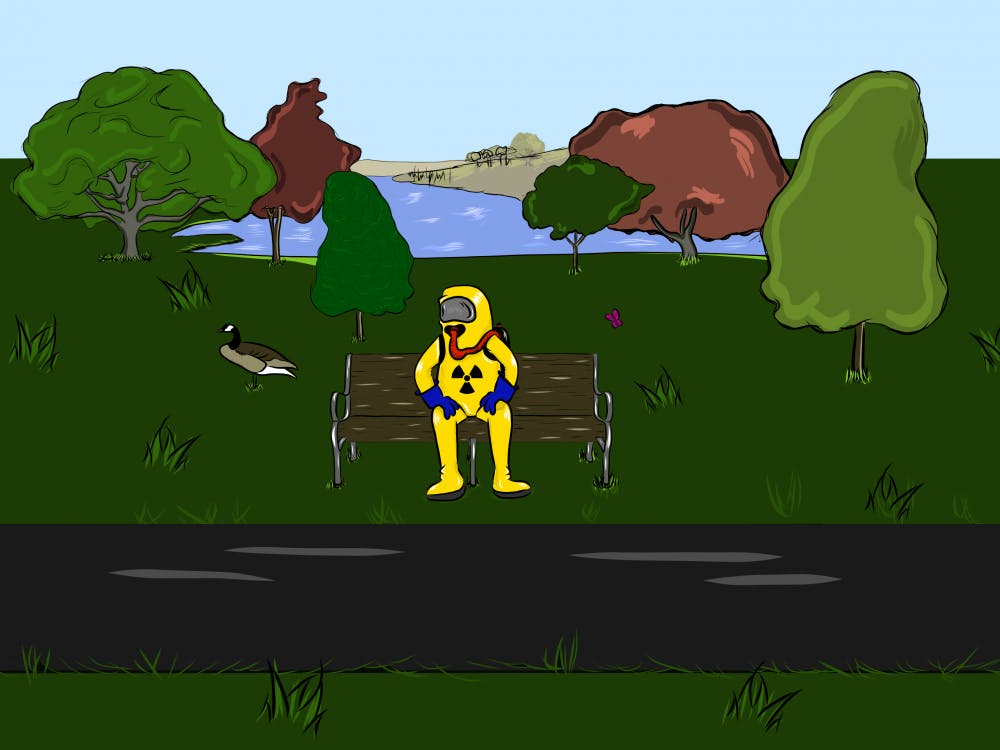I'm a child of 9/11.
I was ten years old when the World Trade Center fell, and the innocence and hope of the '90s fell with it. Memories of that Tuesday and the weeks that followed overshadow most other memories I made in the 10 years prior. I don't remember birthdays, I don't remember too many vacations or camping trips, but I do remember watching the news that day.
I remember a lot of new, scary words like "terrorism" and "threat level." I grew up surrounded by people telling me the world was dangerous, and that the people in it — or at least in some parts of it — were threatening and wanted to get me. That's no one's fault; everyone was swept up in the post-9/11 fear fest. But it took me 15 years to realize one important thing:
The world isn't as unsafe as we think it is.
Zach Torres, a 23-year-old Mary Lou Fulton Teacher's College graduate student, agrees. Although Torres grew up 20 minutes away from ground zero, he thinks America's lingering fear from the attacks is "detrimental."
"It's not only hurting us as a people," said Torres, "but dividing us."
The fear and division is unnecessary. This is arguably the safest time to be a resident of Earth. We're bombarded by headlines every day that push a narrative: sometimes fear, mostly outrage, with the occasional scandal mixed in. I wouldn't blame you if you were reading this right now, and started worrying about the ISIS hit-squad sitting outside of your door.
However, take a minute and remember your freshman history class, the ones with overly long titles like "United States History since Reconstruction." Looking back, it shouldn't be too hard to realize that we're living in the safest time humanity has ever seen.
Fifty-four years ago, the United States and former Soviet Union were only a few miles and one miscommunication away from annihilating each other with nuclear weapons. In what became known as the Cuban Missile Crisis, two of the most powerful empires the world had ever seen played a game of "nuclear chicken" in the Caribbean Ocean. Children practiced "duck and cover:" how to hide under their desks in the event of a nuclear detonation. The world was close to demise.
During the Cold War, people built bomb shelters in their yards. Sure, today there are people that run to Wal-Mart and buy out their entire stock of rifle ammo the first day it hits the shelves. However, they are a fraction of the population. During the Cold War, preparing for "the end" was a way of life, not just wacky behavior exhibited by the paranoid fringes of society.
In July 2016, Britain held a somber celebration remembering the first day of the Battle of the Somme, a battle that took place 100 years ago in World War I. On that day alone, 19,240 British men died. Of course, this was a proverbial bloody drop in the bucket in comparison to the 17 million total deaths that occurred by war's end.
Compared to the American deaths in Iraq and Afghanistan in the over 15 years of the War on Terror, the British lost three times as many soldiers in one day; on the first day of the Battle of the Somme.
Living in 2016, we're blessed with a few certainties in life. At least in America, you can rest easy knowing that you'll probably never contract polio, a disease that was eradicated in the U.S. as of 1979. Before then, for 30 years in the early 20th century, people worried about this constantly. Kids spent their days in iron lungs, and even a president suffered from the disease, albeit secretly.
Sure, the Zika virus is today's terrifying disease. It's new, and we don't know too much about it, which breeds fear. When only a handful of cases of the Ebola virus popped up in the United States, it dominated the news cycle. People lived in fear of a viral hemorrhagic virus they had probably never heard of, although only one person in the U.S. died.
That's not to say that every life isn't important, almost every death is a tragedy. Sure, it can be scary when someone you know falls victim to a strange, hard-to-pronounce disease or some new jihadist group out of the Middle East. Perspective, though, is a valuable tool in combating fear.
Fear erodes the mind, it makes you second guess your decisions. I, like many Americans, lived the years after 9/11 in a perpetual state of muted fear, but no longer. I refuse to fall victim to the primal fears of death or the unknown. Of course, tragedies can and do happen, with some regularity.
However, the world isn't close to tearing itself apart. Two countries no longer stare down the barrel of a nuclear gun, diseases can be treated and managed, and terrorism, while a threat, is not worth losing sleep over.
At the end of the day, you're still 100 times more likely to die from being hit by an asteroid than by a bullet fired by a terrorist.
Reach the columnist at cjwood3@asu.edu or follow @chriswood_311 on Twitter.
Editor’s note: The opinions presented in this column are the author’s and do not imply any endorsement from The State Press or its editors.
Want to join the conversation? Send an email to opiniondesk.statepress@gmail.com. Keep letters under 300 words and be sure to include your university affiliation. Anonymity will not be granted.
Like The State Press on Facebook and follow @statepress on Twitter.




